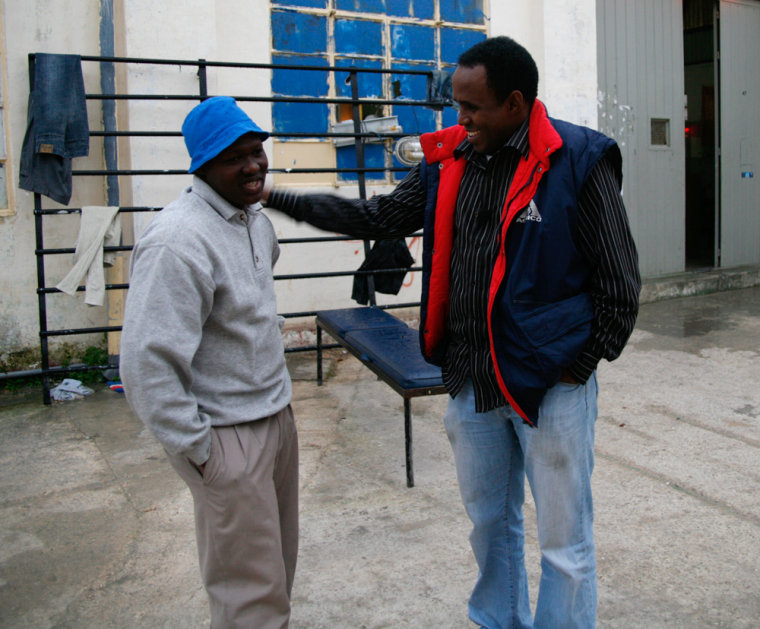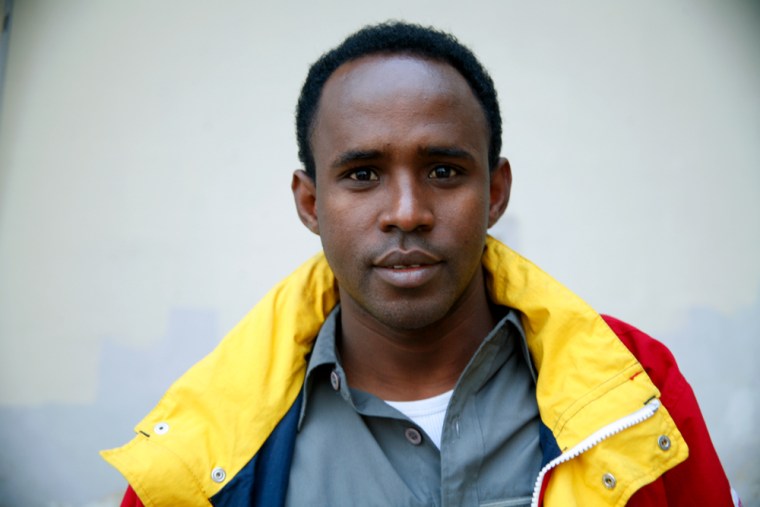Warsame Ali Garare is a multilingual teacher, translator and de facto social worker at the Marsa Open Center, a home for African refugees and migrants like himself in a former school in this industrial town.
“They feel comfortable with me, and come to me to see if I can solve their problems,” Ali Garare said, as he paused during a recent visit to speak to an immigrant at this safe haven.
Walking around the center, with its restaurants, convenience stores, barber shops, Internet café and sleeping halls, Ali Garare often stops to shake hands or embrace the migrants, who depend on his language skills and personal touch.
"The only reason we have the mental stability we have in the center is because of Warsame," said British expatriate Terry Gosden, who hired the Somali in 2005 to help start this facility that now houses about 600 people.
Ali Garare, 27, is fluent in Arabic, English, French and Somali and has some knowledge of Maltese as well as several African languages including Hausa, Swahili and Zarma.
He also has lived through the terrifying journey of migrants who ended up in Malta.
'Grew up in a civil war'
Ali Garare described growing up in a large family in Mogadishu, where his father was a veterinarian.
"In Somalia, I grew up in a civil war," he said, speaking from the main office at the center, which is wedged between a shipyard and red-light district just outside the capital city of Valletta.
"It was the kind of situation where whenever you go out of the house your mother must pray for you just to come back,” he said.
"I used to survive in bad circumstances and did my best to study and work and teach," he said, but, "finally I had no choice." In 2002, the fighting intensified and he fled.
Most of his family remain in Somalia, although one brother managed to reach the United States and lives in North Carolina with his family of five. He once visited Ali Garare in Malta.
"You go from country to country without any papers, through the desert," he said, noting there were no official documents available from a country that had lacked a stable government since 1991.
Pointing to a large map of Africa on the wall above him, he described a two-year trek through Kenya, Ethiopia, Sudan, Niger and Libya. But, he declined to say who he traveled with or to discuss the daily conditions. “I always had problems,” he said, taking a deep breath. “It’s so painful.”
‘Floating’
After working in Libya for six months to pay for and organize his clandestine boat trip to Europe, he was smuggled out of Tripoli.
"(Smugglers) hide you in cars," Ali Garare said, describing the illicit trafficking that flourishes along the North African coastline. Then suddenly, he said, slicing his hand across a table, "you see yourself on the seashore in small boats. … it's a total shock."
Seventeen men were crammed into his boat. Alongside was a boatload of their friends and relatives, many of them women and children.
The two vessels separated almost immediately, and after the third day the motor on Ali Garare's boat died, leaving his group "floating," as they ran out of water and the occupants sucked sugar cubes for sustenance, he said.
"Our target was Italy, but finally we prayed just to land somewhere, anywhere, just to be alive."
As they approached Malta on their sixth day at sea, the coast guard brought them in.
The second boat was not so fortunate; it was never heard from again. "Imagine losing all our relatives," he said.
Founding a 'village'
Here in Malta, Ali Garare spent three months in "the most horrible place," a prison-like closed detention center, while his asylum status was decided. Granted humanitarian protection, he went to live in a military-run home for immigrants.

Recognizing his enthusiasm for social work and his leadership qualities, Gosden hired Ali Garare shortly after he was released.
"When we started, it was just Terry and me serving food and everything," the Somali said, adding that "people were isolated, always in their rooms … they just wanted a way out (of their situation.)"
Creating a group home for hundreds of people, almost all young men, from countries with different languages, cultures, religions, cuisines, and often times from opposite warring factions, was not easy.
In addition, many are mentally scared by war, attacks and deaths along their journeys, and feelings of failure at not being able to reach mainland Europe or find a way to support their families back home.
Also, the Maltese, who had seen very few immigrants, especially black immigrants, prior to 2002, were hostile toward the island’s unwanted guests, according to both immigrants and many Maltese.
After analyzing those variables, "we decided to create a small village here," Ali Garare said, explaining how he and Gosden gave "people a chance to start their own businesses."
"We offered them empty (classrooms), gave them ideas, and then they decided what to run and how to run it," he said.
The people of Marsa soon took initiative, creating East African restaurants, shops, tobacco stands and more.
'The only dream'
While Ali Garare acknowledged that in the long term having a separate "village" — which some Maltese disparigingly refer to as a "ghetto" — would not help integration with the wider community, "it was so hard (before) and now life has changed for them."
"The point here is that everyone created it themselves, as a community, as a group; it's not perfect but it's something they can be proud of," he said.
Despite his busy schedule, Ali Garare can still be found giving a hug to a friend in need or helping translate for a deaf Somali immigrant — as he also knows sign language.
While most of the more than 600 men who now live here appear to look up to him, greeting him with pats on the shoulder wherever he goes, and asking his opinion and for help, Ali Garare explained his own life remains very insecure, given he’s stuck on Malta.
"The only dream I have is to live like anyone else, just to have normal stability in life.”
